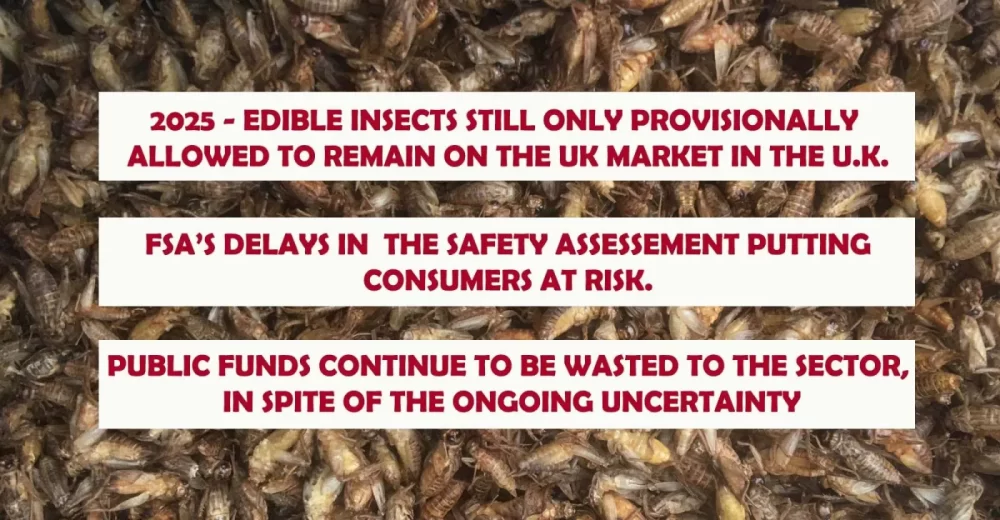Is it legal to eat insects in the UK?
Are edible insects illegal in the UK in 2025?
Edible insects regulations in the UK 2025
The current legal status of edible insects in the UK hangs in the balance. Uncertainty persists in 2025, despite some relief for the edible insect industry under the Food and Feed (Miscellaneous Amendments) Regulations 2022.
This is because the Food Standards Agency has made little or no progress in the safety assessment of edible insects. As a result, under the amended regulations, edible insects can only remain on the market provisionally, leaving businesses and consumers in limbo.
The FSA’s response to the edible insect industry
The FSA’s wrong edible insect guidance
After a BBC News exposé, the FSA was cornered into finally changing its anti edible insect stance , which it had banned “by mistake” on the 31st December 2020. In 2022, the FSA hastily launched a consultation to temporarily legalise certain edible insect species on the GB market.
, which it had banned “by mistake” on the 31st December 2020. In 2022, the FSA hastily launched a consultation to temporarily legalise certain edible insect species on the GB market.
As a result of this consultation and subsequent statutory amendments under The Food and Feed (Miscellaneous Amendments) Regulations 2022, a food business operator could provisionally keep certain edible insect species on the GB market if it:
- Applied to the EU for approval before January 1, 2019.
- Submitted an application to GB authorities before December 31, 2023.
List of provisionally allowed edible insect species
Edible insects yet to be authorised by the regulator
Based on the above criteria, the FSA published a list of insect species that could remain on the market, pending its full safety assessments, through the Novel Food framework.
- Lesser mealworm (Alphitobius diaperinus larvae)
- House cricket (Acheta domesticus)
- Yellow mealworm (Tenebrio molitor)
- Banded or decorated cricket (Gryllodes sigillatus)
- Bird grasshopper / desert locust (Schistocerca gregaria)
- Migratory locust (Locusta migratoria)
- Black soldier fly (Hermetia illucens)
To this date, none of the above insect species has been evaluated for safety by the Food Standards agency and authorisation remains pending. In other words, all of the above listed insect species are being sold in the UK but here is a fifty-fifty chance that they will ultimately banned again once the FSA finally decides whether to authorise them or not. To buy some edible insects while they are still allowed, please check our edible insect UK shop to see what is available.
The FSA’s failure to protect consumers
Through its past “mistake”— which led to a ban on edible insects in GB from December 31, 2020, to July 2022 — and its current inaction, the FSA continues to prioritise other interests over consumer safety and transparency.
By failing to progress with assessments while still allowing edible insects on the market, the FSA neglects its duty to consumers. As a result, consumers can eat edible insects today, but are unknowingly eating products whose safety remains undetermined.
Lack of progress in FSA’s safety assessments
The edible insect species can remain on the market only provisionally, pending the FSA’s safety assessments and full authorisation. However, as of May 2025, the FSA has only started evaluating House Crickets and has made no progress on the remaining six insect species, leaving a big question mark on the edible insects legal status going forward. Since the “mistaken” edible insect ban after Brexit, the FSA’s approach appears to be deliberately hindering the industry’s growth. The FSA’s regulated product applications register verifies this lack of progress.
The register lists Novel Food applications that have passed initial checks to ensure they contain all necessary information, before moving to the safety assessment phase.
The FSA is breaking its own legal deadlines
According to the FSA’s own guidance on Novel Foods, these initial checks should take no more than one month. However, a few years have already passed since food business operators submitted these dossiers, with no significant progress. As result, the edible insect legal status going forward in 2025 and beyond remains uncertain. This is because when the FSA will eventually carry out safety assessments, it may conclude that products should not be on the market, just as it did after Brexit.
In the meantime, the FSA continues to violate its own legal deadlines. In fact, as stated on its Novel Food Guidance page
“The law includes deadlines for key steps in the process. In a full novel food application made under Article 10, one month is allowed for the validation process, then up to nine months (on a start-stop-the-clock basis if further information is needed) for the risk assessment element, with up to a further seven months for any subsequent risk management considerations and authorization decision. These add up to a total of seventeen months as the overall legislative timeline for authorization, noting this can be extended if the clock is stopped and restarted.”
Assessing edible insects for safety should take the FSA months and not several years. Currently, the only validated dossier belongs to Acheta domesticus (House cricket). However, since 2023, the FSA has repeatedly requested additional information from the applicant, further stalling the approval process.
Wasting public funds on a high-risk investment
This situation, largely misunderstood by investors and the media, continues to waste public funds. Over the past decade, the UK has witnessed a surge in investments aimed at advancing edible insect technologies, encompassing both public funding and private capital.
So, while on one hand authorities continue to funnel public resources into edible insect projects, enterprises, universities, and other institutions, on the other hand, the FSA’s approach appears to deliberately hinder the industry’s growth.
No doubt the FSA will claim it is acting in the interest of public safety. However, by failing to conduct any actual safety assessment or establish clear food standards, the FSA is acting against its very mandate to ensure public safety.
Examples of Publicly Funded Edible Insect Projects in the UK
Notable examples of where the UK government has actively supported research and enterprises focused on edible insects through various funding initiatives include:
